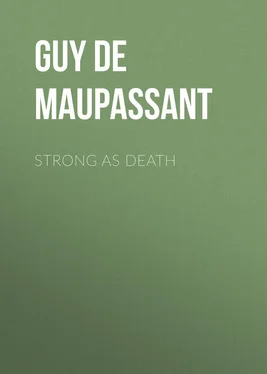Guy Maupassant - Strong as Death
Здесь есть возможность читать онлайн «Guy Maupassant - Strong as Death» — ознакомительный отрывок электронной книги совершенно бесплатно, а после прочтения отрывка купить полную версию. В некоторых случаях можно слушать аудио, скачать через торрент в формате fb2 и присутствует краткое содержание. Жанр: literature_19, foreign_antique, foreign_prose, на английском языке. Описание произведения, (предисловие) а так же отзывы посетителей доступны на портале библиотеки ЛибКат.
- Название:Strong as Death
- Автор:
- Жанр:
- Год:неизвестен
- ISBN:нет данных
- Рейтинг книги:4 / 5. Голосов: 1
-
Избранное:Добавить в избранное
- Отзывы:
-
Ваша оценка:
- 80
- 1
- 2
- 3
- 4
- 5
Strong as Death: краткое содержание, описание и аннотация
Предлагаем к чтению аннотацию, описание, краткое содержание или предисловие (зависит от того, что написал сам автор книги «Strong as Death»). Если вы не нашли необходимую информацию о книге — напишите в комментариях, мы постараемся отыскать её.
Strong as Death — читать онлайн ознакомительный отрывок
Ниже представлен текст книги, разбитый по страницам. Система сохранения места последней прочитанной страницы, позволяет с удобством читать онлайн бесплатно книгу «Strong as Death», без необходимости каждый раз заново искать на чём Вы остановились. Поставьте закладку, и сможете в любой момент перейти на страницу, на которой закончили чтение.
Интервал:
Закладка:
He felt that between them a slow work of reconciliation was going on, and thought that in the Countess’s eyes was something strange: constraint, a sweet sadness, that appeal of a struggling soul, of a faltering will, which seems to say: “But – conquer me, then!”
After a while she came alone once more, reassured by his reserve. Then he treated her as a friend, a comrade; he talked to her of his life, his plans, his art, as to a brother.
Deluded by this attitude, she assumed joyfully the part of counselor, flattered that he distinguished her thus above other women, and convinced that his talent would gain in delicacy through this intellectual intimacy. But, from consulting her and showing deference to her, he caused her to pass naturally from the functions of a counselor to the sacred office of inspirer. She found it charming to use her influence thus over the great man, and almost consented that he should love her as an artist, since it was she that gave him inspiration for his work!
It was one evening, after a long talk about the loves of illustrious painters, that she let herself glide into his arms. She rested there this time, without trying to escape, and gave him back his kisses.
She felt no remorse now, only the vague consciousness of a fall; and to stifle the reproaches of her reason she attributed it to fatality.
Drawn toward him by her virgin heart and her empty soul, the flesh overcome by the slow domination of caresses, little by little she attached herself to him, as do all tender women who love for the first time.
With Olivier it was a crisis of acute love, sensuous and poetic. It seemed to him sometimes that one day he had taken flight, with hands extended, and that he had been able to clasp in full embrace that winged and magnificent dream which is always hovering over our hopes.
He had finished the Countess’s portrait, the best, certainly, that he ever had painted, for he had discovered and crystallized that inexpressible something which a painter seldom succeeds in unveiling – that reflection, that mystery, that physiognomy of the soul, which passes intangibly across a face.
Months rolled by, then years, which hardly loosened the tie that united the Comtesse de Guilleroy and the painter, Olivier Bertin. With him it was no longer the exaltation of the beginning, but a calm, deep affection, a sort of loving friendship that had become a habit.
With her, on the contrary, the passionate, persistent attachment of certain women who give themselves to a man wholly and forever was always growing. Honest and straight in adulterous love as they might have been in marriage, they devote themselves to a single object with a tenderness from which nothing can turn them. Not only do they love the lover, but they wish to love him, and, with eyes on him alone, they so fill their hearts with thoughts of him that nothing strange can thenceforth enter there. They have bound their lives resolutely, as one who knows how to swim, yet wishes to die, ties his hands together before leaping from a high bridge into the water.
But from the moment when the Countess had yielded, she was assailed by fears for Bertin’s constancy. Nothing held him but his masculine will, his caprice, his passing fancy for a woman he had met one day just as he had already met so many others! She realized that he was so free, so susceptible to temptation – he who lived without duties, habits, or scruples, like all men! He was handsome, celebrated, much sought after, having, to respond to his easily awakened desires, fashionable women, whose modesty is so fragile, women of the demi-monde of the theater, prodigal of their favors with such men as he. One of them, some evening after supper, might follow him and please him, take him and keep him.
Thus she lived in terror of losing him, watching his manner, his attitudes, startled by a word, full of anguish when he admired another woman, praised the charm of her countenance or her grace of bearing. All of which she was ignorant in his life made her tremble, and all of which she was cognizant alarmed her. At each of their meetings she questioned him ingeniously, without his perceiving it, in order to make him express his opinion on the people he had seen, the houses where he had dined, in short, the lightest expression of his mind. As soon as she fancied she detected the influence of some other person, she combated it with prodigious astuteness and innumerable resources.
Oh, how often did she suspect those brief intrigues, without depth, lasting perhaps a week or two, from time to time, which come into the life of every prominent artist!
She had, as it were, an intuition of danger, even before she detected the awakening of a new desire in Olivier, by the look of triumph in his eyes, the expression of a man when swayed by a gallant fancy.
Then she would suffer; her sleep would be tortured by doubts. In order to surprise him, she would appear suddenly in his studio, without giving him notice of her coming, put questions that seemed naïve, tested his tenderness while listening to his thoughts, as we test while listening to detect hidden illness in the body. She would weep as soon as she found herself sure that some one would take him from her this time, robbing her of that love to which she clung so passionately because she had staked upon it all her will, her strength of affection, all her hopes and dreams.
Then, when she saw that he came back to her, after these brief diversions, she experienced, as she drew close to him again, took possession of him as of something lost and found, a deep, silent happiness which sometimes, when she passed a church, urged her go in and thank God.
Her preoccupation in ever making herself pleasing to him above all others, and of guarding him against all others, had made her whole life become a combat interrupted by coquetry. She had ceaselessly struggled for him, and before him, with her grace, her beauty and elegance. She wished that wherever he went he should hear her praised for her charm, her taste, her wit, and her toilets. She wished to please others for his sake, and to attract them so that he should be both proud and jealous of her. And every time that she succeeded in arousing his jealousy, after making him suffer a little, she allowed him the triumph of winning her back, which revived his love in exciting his vanity. Then, realizing that it was always possible for a man to meet in society a woman whose physical charm would be greater than her own, being a novelty, she resorted to other means: she flattered and spoiled him. Discreetly but continuously she heaped praises upon him; she soothed him with admiration and enveloped him in flattery, so that he might find all other friendship, all other love, even, a little cold and incomplete, and that if others also loved him he would perceive at last that she alone of them all understood him.
She made the two drawing-rooms in her house, which he entered so often, a place as attractive to the pride of the artist as to the heart of the man, the place in all Paris where he liked best to come, because there all his cravings were satisfied at the same time.
Not only did she learn to discover all his tastes, in order that, while gratifying them in her own house, she might give him a feeling of well-being that nothing could replace, but she knew how to create new tastes, to arouse appetites of all kinds, material and intellectual, habits of little attentions, of affections, of adoration and flattery! She tried to charm his eye with elegance, his sense of smell with perfumes, and his taste with delicate food.
But when she had planted in the soul and in the senses of a selfish bachelor a multitude of petty, tyrannical needs, when she had become quite certain that no mistress would trouble herself as she did to watch over and maintain them, in order to surround him with all the little pleasures of life, she suddenly feared, as she saw him disgusted with his own home, always complaining of his solitary life, and, being unable to come into her home except under all the restraints imposed by society, going to the club, seeking every means to soften his lonely lot – she feared lest he thought of marriage.
Читать дальшеИнтервал:
Закладка:
Похожие книги на «Strong as Death»
Представляем Вашему вниманию похожие книги на «Strong as Death» списком для выбора. Мы отобрали схожую по названию и смыслу литературу в надежде предоставить читателям больше вариантов отыскать новые, интересные, ещё непрочитанные произведения.
Обсуждение, отзывы о книге «Strong as Death» и просто собственные мнения читателей. Оставьте ваши комментарии, напишите, что Вы думаете о произведении, его смысле или главных героях. Укажите что конкретно понравилось, а что нет, и почему Вы так считаете.












